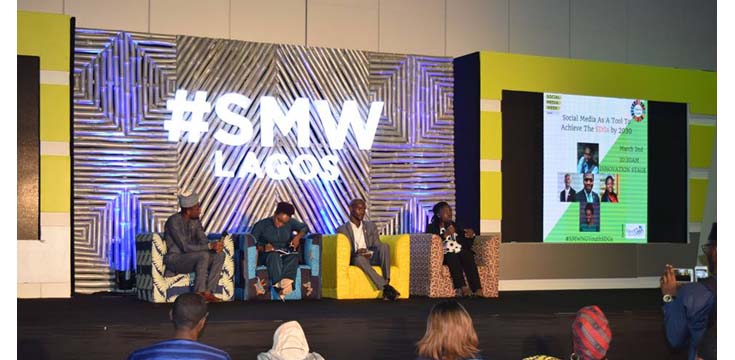Leveraging social media to drive accountability for the SDGs in Nigeria
On Friday, March 2nd, the Nigerian Youth SDGs Network hosted a session on the theme “Social Media as a Tool to Achieve the 2030 Agenda” at the 6th Social Media Week Lagos which lasted between February 26 to March 2, 2018 at Lagos, Nigeria

This year’s Social Media Week themed “Closer” which was part of the larger Social Media Week conference hosted in 12 cities around the world explored the intensifying conflict between community and individualism and had in attendance a diversity of people who discussed the most productive ways to harness these forces to drive innovation, improve consumer experiences and bring people together.
Conscious of the role the social media could play in the successful realization of the SDGs in Nigeria, the Nigerian Youth SDGs Network, a national coalition of youth-led and youth-focused civil society organizations driving local accountability for the United Nations Sustainable Development Goals in Nigeria, therefore leveraged the opportunity presented by the 2018 Lagos Social Media Week Conference to host a session on the role of the social media in achieving Agenda 2030.
“‘Social Media as a Tool to Achieve the 2030 Agenda’ will discuss how young people can use social media to drive accountability for the SDGs and create an ecosystem to localize the goals whilst creating awareness for the work they are involved with,” says a press statement by the Network prior to the event.
Now in it is 8th year, the Social Media Week is a worldwide event exploring the social, cultural and economic impact of social media. Its mission is to help people and organizations connect through collaboration, learning and the sharing of ideas and information.
Thus, the session on how young people could leverage social media to drive accountability for the SDGs had as panelists Jennifer Uchendu, founder of Susty Vibes, an online platform for sustainability trends in Africa and Adepeju Jaiyeoba, founder of Brown Button Foundation, a nonprofit that trains birth attendants in rural villages in Nigeria.
Others were Runcie Chidebe, founder of Project PinkBlue, a nonprofit engaged in raising awareness about cancer in Nigeria as well as Olumide Idowu, co-founder of Climate Wednesday, a nonprofit that seeks to build a climate smart generation in Africa, who moderated the panel.
While speaking during the session, Jennifer Uchendu of Susty Vibes spoke on how she and members of her team at Susty Vibes were using social media, pop culture, hangouts and movies to discuss societal issues on women and climate.
‘’I use twitter a lot,” said Uchendu. “Twitter gives me the opportunity to lend my voice in real time to pressing issues that I am passionate about. With hashtags, I can follow up on trends and offer my opinion in the areas of sustainability and livelihoods for women. Our major strategy is to help everyone see that sustainable living is a cool thing and we try to use every channel we can including social media to make sustainability popular.’
Adepeju Jaiyeoba, the founder of the Brown Button Foundation, a nonprofit that have given out more than one hundred thousand delivery kits to women in rural areas across Nigeria through its Mothers Delivery Kits initiative said she used her personal Facebook page to educate people about maternal health issues and also mentor young people on different life vocations –from entrepreneurship to volunteering.
“I am very comfortable with Facebook as I can share insights and keep in touch with the people I love and care about. It is a community I am endeared to and I value every interaction shared on that platform. Facebook works for me as I am a lawyer and a mom who runs a business that offers first class delivery kits to women mostly in rural Nigeria. And because I can be away for a long time, I return during break or later in the evening to give feedback or reply to comments,’’ Jaiyeoba said.
Runcie Chidebe founded Project Pink Blue during his National youth service programme in 2013 to advocate and raise funds for cancer treatment for Nigerians who do not know about cancer or were not able to meet treatment bills.
“Because we started lean, in the beginning we had to rely so much on social media for awareness and we still use social media to create and mobilize volunteers for our annual cancer walk,” Chidebe said. “I realized that being intentional in my use of social media for advocacy is vital in projecting the work that Project Pink Blue does. Facebook has helped me raise an army of volunteers, I always think of how I can use the platform to disrupt and engage positively with the right audience.’’
Olumide Idowu of Climate Wednesday who moderated the event said “Hashtag is key when it comes to engaging and carrying along young people on issues that affect women and the environment because youths have a strong voice on social media; using social media channels effectively help bring about change.”
All panellists at the session emphasized the need for consistency in social media engagement as well as the need for social media users to connect with relevant audience for partnerships and collaborations towards achieving the 2030 Agenda. No doubt, achieving the Sustainable Development Goals (SDGs) in Nigeria hinges, to a large extent, on fostering effective youth engagement, quality partnerships and fruitful collaborations – and the social media is a perfect platform for achieving all.









